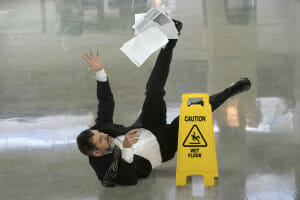Let’s face it, we live in a litigious society. One of the most common lawsuits is the personal injury or “Slip and Fall” suit.
As a property manager you have a duty to keep your property safe for visitors, vendors, residents, and their guests. If you don’t fulfill this obligation, you could endanger these people and expose yourself to a lawsuit that could place your business at grave risk.
The key to injury prevention: be ever-vigilant
Walk your property, every step of it. Inspect every square foot for potentially dangerous problems. How often? In a perfect world, daily. If you manage large properties, though, a great rule of thumb is once per week. No matter what your property size or resources are, the key is to remember to inspect your property thoroughly and regularly.
Survey the landscape and look for uneven surfaces
Check the landscape for problems, including dead branches that could break off and hit someone, standing water, holes and plants dug up by animals, poisonous plants, and biting insects like wasps. Drape yellow warning tape around any risky area until you can fix the problem. Look throughout your property for uneven surfaces; even a ¼-inch difference can cause someone to stub a toe and fall. Keep an eye out for cracks in the pavement, uneven sidewalks, potholes, ramps, parking lot bumpers, speed bumps, or defects in walkways, to name but a few. Spray paint dangerous areas with yellow glow-in-the-dark paint or surround it with yellow caution tape, and post warning signs to alert pedestrians until the repairs are completed.
Check stairs, stairways, sidewalks, and railings
Whether a single step or an entire flight, cover the edge of every step with non-slip tread or tape in a color that’s different than that of the step. The idea is to make stairs less slippery and to provide a clear visual cue to people with depth perception problems. Make sure all handrails are secure, and for good measure, post a “For your safety, always use the handrails” sign. In stairwells, check that emergency backup lights are working, and post exit signs on every floor. Ensure that sidewalks and parking lots always are well-lit and debris-free. If your units have balconies, inspect the railings every six months. If there is a gap between the railings where small children could get their heads stuck, install plastic webbing you can find at Home Depot, Lowes, and most home improvement stores.
Safeguard the pool area
A pool is wonderful for residents but is often the cause of personal injury lawsuits. The pool deck should be non-slip. Paint “No diving” warnings on each end of the pool, and place a U.S. Coast Guard-approved life ring at each end that swimmers can easily spot and use. If possible, hire a lifeguard, especially if you manage several multi-family units. If you are servicing the pool yourself, always follow health department guidelines to ensure the proper amount of chemicals is used to prevent disease. Secure drain covers and make sure they’re flush with the surface. Install a working lock system on the pool area gate so it’s secure after swimming hours, and don’t forget “Swim at your own risk” signs to remind people when lifeguards are off duty.
Keep children safe
If you have a playground, inspect the equipment regularly. Look for sharp or jagged edges, rust, chipping paint, loose objects — anything that could hurt a child. Ensure the fence around the playground is secure and can be locked when not in use. Post a “Children must be accompanied by an adult” sign and enforce the rule. It’s also an excellent idea to post “Children at play” signs and add a few bright yellow speed bumps to the roads leading to and from the playground.
Document everything and consult your attorney
Photograph and date all warning markings, signs, and repairs. Document your efforts in your property management software or logs to show that you have made a reasonable effort to make the property as safe as possible. Everything look good? Now it’s time to ask your attorney to tour the property with you because he or she will represent you if someone sues you. Additionally, your attorney might notice something you may have missed, and that ounce of prevention can make a critical difference in keeping your tenants — and everyone else who uses or visits your property — safe and injury-free.
The above are recommendations only and are not intended or should be considered legal advice.
Read more on Maintenance

